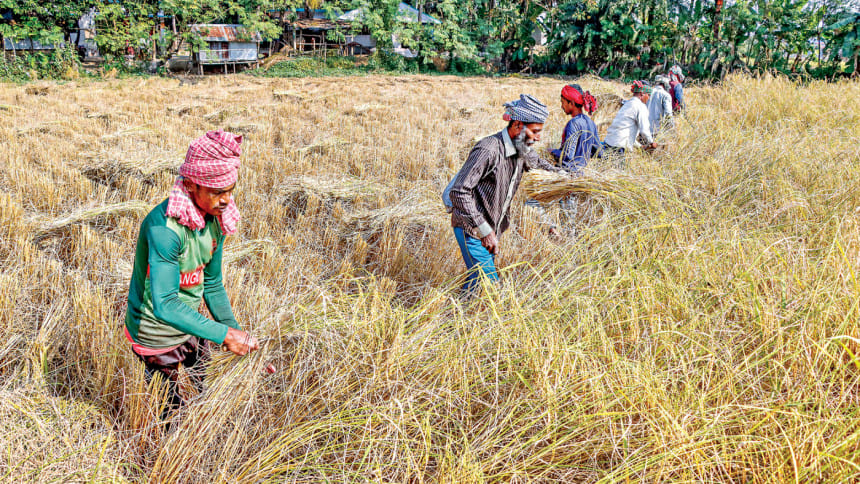Govt plans smart cards for farmers

The government is formulating a policy with the aim of distributing smart cards among farmers to ensure the delivery of subsidies and other government support, such as that for coping with natural disasters.
The draft "Farmer Smart Card Policy 2025" proposes adopting data technologies and creating a national database of farmers featuring profiles and registration IDs by 2030.
The process of creating and distributing smart cards for farmers is similar to that for national ID cards, Mohammad Emdad Ullah Mian, secretary to the Ministry of Agriculture, told The Daily Star.
The project was taken up by the previous government and was reviewed by the interim government prior to the formulation of the draft policy, he said.
This card will help farmers avail agricultural inputs such as seeds, fertilisers and pesticides. They will also be afforded assistance in crop cultivation, storage and sale.
It will also be used for the expansion of financial inclusion, such as through loan disbursements, promotion of sustainable agricultural practices and delivery of services such as weather forecasts, agricultural advice and market data.
Overall, the cards will increase productivity and food security, enable economic empowerment, improve farmers' quality of life and ensure sustainable development.
"This is a good initiative. However, there is always a concern about proper implementation," said Mohammad Jahangir Alam, a professor of the Department of Agribusiness and Marketing at the Bangladesh Agricultural University.
This database will store crucial information and when a farmer needs access to government support or subsidies, this card will be used, he said.
"Another reason why this initiative is necessary is, for example, when there are government programmes to procure rice or paddy, many farmers use cards to sell their produce at procurement centers in order to secure better prices than the market rate," he added.
He said the problem here is that the card alone may not be sufficient. For the system to function effectively, stakeholders and implementation officials must ensure transparency.
The purpose of this card is to address that issue by ensuring proper identification -- whether a person is a small farmer, large farmer, original farmer, or medium-scale farmer, he said.
He added that those involved in implementing this system must manage it properly and work with the administration transparently and honestly.
"If I had to make one single comment, I would say that such a database should be maintained continuously."
He mentioned if that happens, this would undoubtedly be a good initiative.
"However, one concern remains. Since this is being developed under a project framework, there need to be periodic updates. A farmer's information -- such as land ownership details -- must be updated whenever land is bought or sold."
The Department of Agricultural Extension (DAE) published the draft on its website on January 28 seeking feedback from the public by today.
The formulation of the policy is a part of a five-year government "Programme on Agricultural and Rural Transformation for Nutrition, Entrepreneurship and Resilience" initiated in July 2023.
Implementing the programme will cost around Tk 7,000 crore, to be jointly provided by the government, World Bank and the International Fund for Agricultural Development.
According to the Agriculture Census 2019, there are approximately 16.9 million agricultural households in the country.
Around 61.7 percent of Bangladesh's total land area of 14.3 million hectares is arable.
Agriculture accounted for 11.38 percent of the country's gross domestic product in fiscal year 2022-23.
That year, about 45.4 percent of the total labour force was employed in the agriculture sector.

 For all latest news, follow The Daily Star's Google News channel.
For all latest news, follow The Daily Star's Google News channel. 



Comments